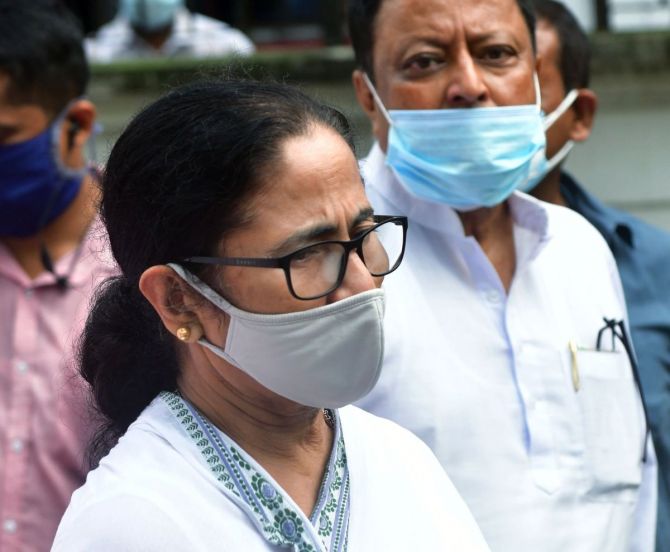 | « Back to article | Print this article |
Justice Kausik Chanda of the Calcutta high court Wednesday recused from hearing West Bengal Chief Minister Mamata Banerjee's petition challenging the election of Bharatiya Janata Party's Suvendu Adhikari from Nandigram, while imposing a cost of Rs 5 lakh for the manner in which the recusal was sought.

Releasing the election petition of Banerjee, Justice Chanda said that he was doing so in order to thwart at the outset attempts by trouble-mongers to keep the controversy alive.
"A deliberate and conscious attempt was made to influence my decision before the recusal application was placed before me for judicial consideration on June 24," Justice Chanda observed pointing at social media posts by some TMC leaders.
"The calculated psychological offensives and vilification adopted to seek recusal need to be firmly repulsed, and a cost of Rupees five lakh is imposed upon the petitioner," he said.
In the 13-page order, the judge said that the imbroglio stemmed from the inception of the litigation due to the assignment of the case before his bench.
"Since the two persons involved in this case belong to the highest echelon of the State politics, in the name of saving the judiciary, some opportunists have already emerged. These trouble-mongers will try to keep the controversy alive and create newer controversies," the court observed.
"The trial of the case before this Bench will be a tool to aggrandise themselves. It would be contrary to the interest of justice if such unwarranted squabble continues along with the trial of the case, and such attempts should be thwarted at the threshold," Justice Chanda said.
He said that the hearing of the case should proceed seamlessly, like any other litigation.
He noted that like any other citizen of the country, a judge also exercises his voting rights in favour of a political party, but he lays aside his individual predilection while deciding a case.
"Ironically, two leading counsel engaged in the case have well known political identities adverse to the petitioner's party," the court observed.
Abhishek Manu Singhvi and SN Mookherjee are two senior advocates representing the TMC chief in her election petition against Adhikari.
The court said that it is preposterous to suggest that a judge having a past association with a political party as a lawyer should not receive a case involving the said political party or any of its members.
"The past association of a Judge with a political party by itself cannot form apprehension of bias," the bench said.
"This proposition, if allowed to be accepted, would be destructive to the long-lived and deep-rooted notion of neutrality associated with the justice delivery system and lead to the unfair practice of Bench hunting to resist a fair adjudication by an unscrupulous litigant," Justice Chanda observed.
The bench noted that Banerjee sought recusal "since she apprehends that her objection against my confirmation as a permanent Judge of this Court is known to me," maintaining that in his view, such ground also cannot justify recusal.
The petitioner cannot seek recusal based upon her own consent or objection with regard to the appointment of a judge, the bench said, adding that a judge cannot be said to be biased because of a litigant's own perception and action.
"If such an argument is accepted, the election petition cannot be tried before this Court since the petitioner, in her capacity as the Chief Minister of the State, has either objected or gave consent to the appointments of most of the Hon'ble Judges of this Court," Justice Chanda said.
In his order, Justice Chanda noted that a letter by the petitioner's counsel to the Acting Chief Justice of the Calcutta high court on June 16 seeking that the election petition be reassigned to another judge "contained highly confidential information concerning the appointment of a Judge of the High Court, and the petitioner, being the chief minister of the State, who took the oath of secrecy, was constitutionally obliged to maintain the secrecy of such information."
Observing that "the script was already prepared; the dramatis personae were ready to launch a well-rehearsed drama outside the Court", Justice Chanda said "on the own showing of the petitioner in the recusal application, it appears that the chief national spokesperson and leader of the petitioner's party in the Rajya Sabha was ready by that time with two photographs of mine attending a programme of BJP legal cell in the year 2016."
Justice Chanda said that another Member of Parliament of the TMC also by that time, apparently, "was ready with a purported list of cases where I had appeared for the Bharatiya Janata Party as a lawyer."
The judge said "a nationwide controversy ensued" as some other state leaders of the party came up before the press and demanded recusal of this bench from the case.
Banerjee's lawyers had suggested that Justice Chanda should recuse himself from the case since he was associated with the legal cell of the BJP before his elevation as a judge and had appeared in a number of cases on behalf of the BJP before the high court as a lawyer.
After placing the application for recusal, Singhvi had submitted that the judge's close and long association with the BJP prior to his elevation was apparent.
He had suggested during his submissions that there is a conflict of interest since Justice Chanda had a close, professional, pecuniary and ideological relation with the BJP and the petitioner has challenged the election of a BJP candidate.
Singhvi had submitted that "the Hon'ble Judge of this Hon'ble Court should be like Caesar's wife, above suspicion" and it is not worth getting involved in the controversy.